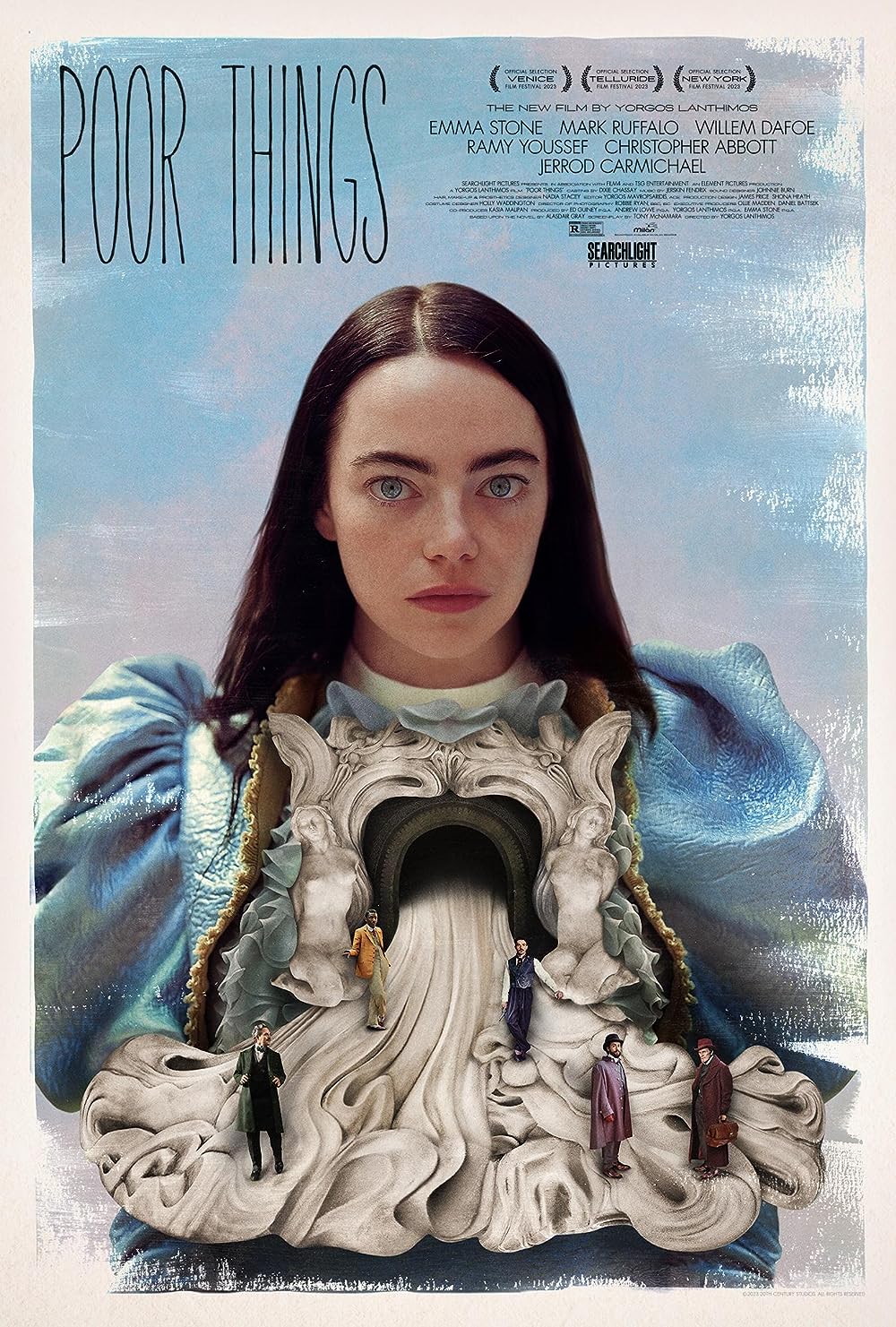Review of Poor Things Directed by Yorgos Lanthimos

Poor Things, 2023, 2h 21m
Directed by Yorgos Lanthimos
Reviewed by Henri Bensussen
Emma Stone won a Best Actress Oscar for this exceptional movie. Nominated for all the top “Bests,” Poor Things also won for Best Production Design, Costume Design, and Make-up/Hair Styling. The movie is based on Alasdair Gray’s 1992 novel of the same name, which the L.A. Times Book Review called a “liberating vision of sexuality” told with “scathing wit.” Publishers Weekly called it a “work of inspired lunacy.” The screen play, written by Tony McNamara, builds on these tropes. Emma Stone, a co-producer, inhabits the role of Bella Baxter to the limits of current cinematography.
I am drawn to Victorian novels with their dark secrets and fraught romances, and movies with strong women protagonists. I liked the outrageous, comical The Favourite by the same director, also featuring Emma Stone. In this film, she becomes Bella, portraying so naturally her behavior and emotions that I felt like I was there, watching from just out of the camera’s range, pondering the oddness of this child, watching her grow into a young woman. She reminded me of my own growing-up years, with a girlfriend who was always ready for a race on roller skates or putting on a play. Poor Things is everything wrapped up together, a send-up of Frankenstein’s Monster, Jane Eyre, Little Women, and Northanger Abbey.
The Scottish surgeon Godwin Baxter (Willem Dafoe) is lauded for his faultless way of sewing parts of people together and beautifully restoring them to life. At home we see various odd animals running happily about his garden: a pig’s head with a goat’s middle and a calf’s back end, say, or a duck with a giraffe’s neck. At the head of a long dining table sits Bella Baxter, Godwin’s daughter. She has the stature of a young woman yet acts like a young child. It is all strange, as if we’re in Alice’s Wonderland. No harsh voices, no big dramatic scenes. This is the lively garden of Dr. Baxter, featuring his sewn-together farm animals, and a family enjoying their calm and matter-of-fact life.
Bella was born when Godwin dragged a pregnant suicide out of the river and into his surgery, substituting the brain of her fetus for her own dead one. Over the course of the film we see Bella’s new brain take over as she grows from babyhood to girlhood, learning about her own body and the joys of masturbation. By the age of twelve she’s reading the medical books in her father’s library. Bella is not formally educated, but is allowed to educate herself, the way Mary Shelley did, and as many of us “book worms” did.
A curious child, Bella retains her curiosity throughout her life. As her brain catches up with her body, she attracts Godwin’s student Max (Ramy Youssef), a kind and caring man who offers marriage, and then the dastardly Duncan (Mark Ruffalo). Duncan, a rich lawyer, gambler, and drinker, offers sex and a trip to Europe. Bella agrees to marry Max, but chooses to go with Duncan so she can learn more about the world. In the many naked scenes that follow, Bella enjoys sex and often wants it. These scenes, directed by Emma Stone, are done so naturally there was no sense for me of their being pornographic. Gothic moments ensue as they travel to many countries. She wanders freely among people without any shyness–imitating, learning, curious. The audience, watching alongside Bella, sees the people as she does.
When Bella discovers poverty, she feels compassion for the poor and gives away all of Duncan’s money. Penniless, stranded in Paris, Duncan falls apart while Bella discovers that as a prostitute she can earn money. At the brothel she’s courted by the Madame Swiney (Kathryn Hunter) and falls in love with another worker there, Toinette (Suzy Bemba), until an ill Godwin calls her home to his deathbed. There, as she prepares to marry Max, the film takes another twist. Bella learns she has a husband (Christopher Abbott), the husband she escaped by drowning. She gives herself to him because that is what wives do.
He brings her to his castle, threatens genital mutilation, and takes up his gun when she tries to leave. She fights back, causing him to pass out after shooting himself in the foot. This leads to the final scene, a hilarious moment for me and many other women in the audience. Now a successful surgeon herself, following in Godwin’s footsteps, Bella is at home in the garden with her lover Toinette, served by the faithful Max, and with her former husband changed into an odd animal with the brain of a goat. Many men in the audience of the theater I was at were not smiling, but seemed puzzled by this ending.
Henri Bensussen writes on themes of inter-personal/inter-species relationships, aging, and the comic aspects of the human condition from the viewpoint of a birder, biologist, and gardener. Currently, a book-length memoir is her focus, and she continues to publish poetry and creative non-fiction.
"Empowerment comes from ideas."
― Charlene Carruthers
"Your silence will not protect you."
— Tourmaline
"Gender is the poetry each of us makes out of the language we are taught."
— Leila Raven


